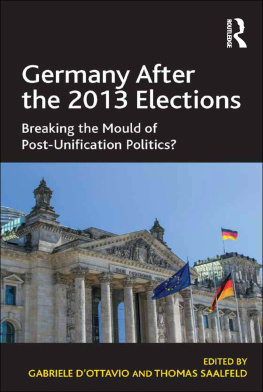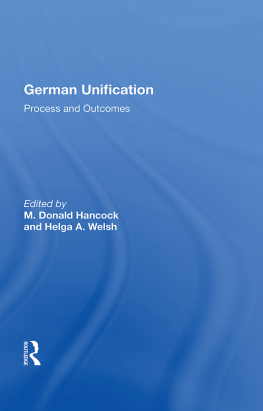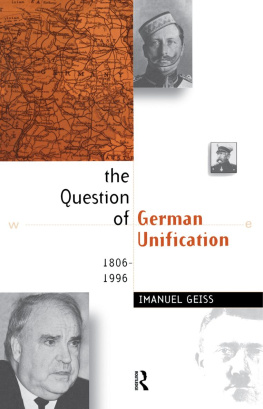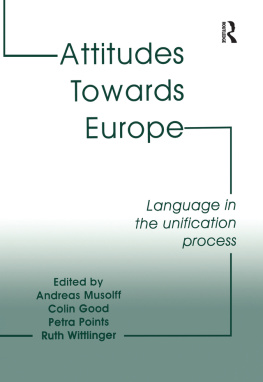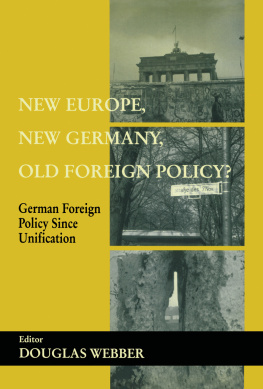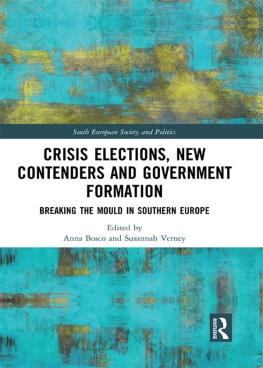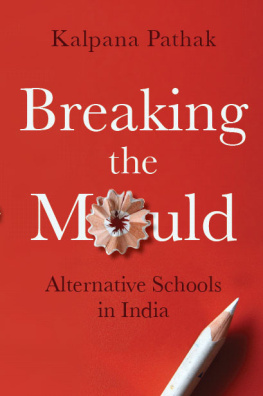Germany After the 2013 Elections
Breaking the Mould of Post-Unification Politics?
Edited by
GABRIELE DOTTAVIO
Italian-German Historical Institute-FBK, Italy and
University of Trento, Italy
THOMAS SAALFELD
University of Bamberg, Germany
First published 2015 by Ashgate Publishing
Published 2016 by Routledge
2 Park Square, Milton Park, Abingdon, Oxon OX14 4RN
711 Third Avenue, New York, NY 10017, USA
Routledge is an imprint of the Taylor & Francis Group, an informa business
Copyright Gabriele DOttavio and Thomas Saalfeld 2015
Gabriele DOttavio and Thomas Saalfeld have asserted their right under the Copyright, Designs and Patents Act, 1988, to be identified as the editors of this work.
All rights reserved. No part of this book may be reprinted or reproduced or utilised in any form or by any electronic, mechanical, or other means, now known or hereafter invented, including photocopying and recording, or in any information storage or retrieval system, without permission in writing from the publishers.
Notice:
Product or corporate names may be trademarks or registered trademarks, and are used only for identification and explanation without intent to infringe.
British Library Cataloguing in Publication Data
A catalogue record for this book is available from the British Library
The Library of Congress has cataloged the printed edition as follows:
DOttavio, Gabriele.
Germany after the 2013 elections : breaking the mould of post-unification politics? / by Gabriele DOttavio and Thomas Saalfeld.
pages cm
Includes bibliographical references and index.
ISBN 978-1-4724-4439-4 (hardback) ISBN 978-1-3155-8465-2 (ebook) ISBN 978-1-3171-2837-3 (epub) 1. Germany. Bundestag Elections, 2013. 2. Elections Germany History 21st century. 3. Political parties Germany History 21st century. 4. Germany Politics and government 1990-I. Saalfeld, Thomas, 1960- II. Title.
JN3971.A95D36 2015
320.943 dc23
2014039543
ISBN 9781472444394 (hbk)
ISBN 9781315584652 (ebk-PDF)
ISBN 9781317128373 (ebk-ePUB)
Acknowledgements
This volume is the result of a truly collaborative effort which was made possible by a number of people and organizations. First and foremost, we would like to thank the Istituto Carlo Cattaneo in Bologna for launching this project and asking us to make it real. A workshop at the Johns Hopkins University School of Advanced International Studies (SAIS) in Bologna, two months after the German election of 22 September 2013, allowed all contributors to meet and discuss their work and interpretations of the election. We would like to thank the Johns Hopkins University SAIS Europe, the Department of Political and Social Sciences of the University of Bologna, the German-Italian University Centre and the Italian-German Historical Institute-FBK in Trento for their generous financial support in making this workshop possible. We are also grateful to Erik Jones, Winrich Khne, Hanns W. Maull and Salvatore Vassallo for acting as chairs and discussants offering their valuable insights. Special thanks are due to Elisa Piras for her generous assistance during the preparation of the manuscript. We are also grateful to Anne Hudson for the final proofreading of the volume, and to Brenda Sharp, Rob Sorsby and Philip Stirups at Ashgate. Johannes Geiger, Lukas Hohendorf and Fabio Rssler assisted us in compiling the index. Last but not least, we would like to thank each contributor for their participation in this project and their efficiency in delivering their essays at relatively short notice after the election.
Gabriele DOttavio and Thomas Saalfeld
Notes on Contributors
Gianfranco Baldini is associate professor of political science at the University of Bologna. In 2007 he founded the book series Elections, governments, democracy (Egd) at the Istituto Cattaneo Research Foundation, also in Bologna. He was deputy-director of the Cattaneo Research Foundation in 201011. The Egd series, which he has directed since 2012 as sole coordinator, publishes volumes in Italian and English on the political systems of the biggest European countries after relevant general elections (a corresponding volume on Germany is forthcoming from Il Mulino). He has published extensively comparative works on representation, elections, electoral systems and territorial politics. Among international publications are the following: Italian Politics. Governing Fear (co-ed. A. Cento Bull), Berghahn Books, 2010; Elections, Electoral Systems and Volatile Voters (with A. Pappalardo), Palgrave, 2010; and Coalition Britain. The UK Election of 2010 (co-ed. J. Hopkin), Manchester University Press, 2012. He has published in, among others, West European Politics, Government and Opposition, and Regional and Federal Studies.
Silvia Bolgherini holds a PhD in political science (2003) and is assistant professor at the University of Naples Federico II (Italy) where she teaches comparative politics and public policy analysis. She was research fellow at the Istituto Carlo Cattaneo, Bologna, and named Ladislao Mittner Laureate for political science in 2007 by the German-Italian University Centre/German Academic Exchange Service (DIH/DAAD). In addition, she was visiting scholar at the University of Granada (Spain) between 2012 and 2013; at the Freie Universitt Berlin and at the University of Potsdam (Germany) in 2008 and 2012; and at Sciences-PO/CNRS, Paris (France) between 2004 and 2006. She has published widely on comparative politics, electoral studies, European studies and local government. Her recent books include Oltre le Province. Enti intermedi in Italia e in Europa (Padua University Press, 2014, co-edited with P. Messina); La Germania di Angela Merkel (Bologna: Il Mulino, 2010, co-edited with F. Grotz); Come le regioni diventano europee.Stili di governo e sfide comunitarie nellEuropa mediterranea (Bologna: Il Mulino, 2006).
Gabriele DOttavio is research fellow at the Italian-German Historical Institute-FBK in Trento and teaches international and European history at the University of Trento (Italy). He holds a PhD in contemporary history from the University of Bologna. He was DAAD-visiting fellow at the Humboldt University (Berlin) between 2005 and 2006, visiting fellow at the European University Institute (Florence) between 2009 and 2011, and visiting fellow at the Goethe-University (Frankfurt am Main) in 2015. He is a member of the editorial board of Ventunesimo Secolo. Rivista di Studi sulle Transizioni and a member of the editorial secretariat of Annali dellIstituto storico italo-germanico/Jahrbuch des italienisch-deutschen historischen Instituts


